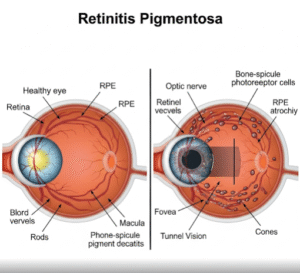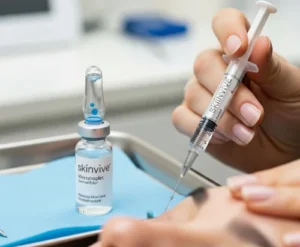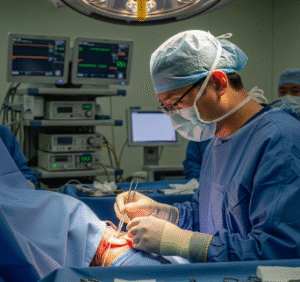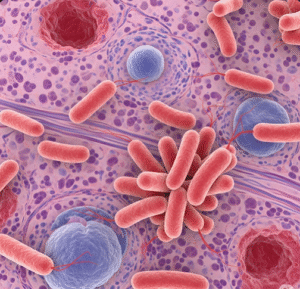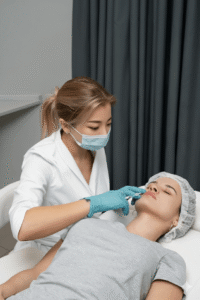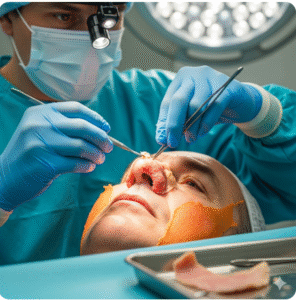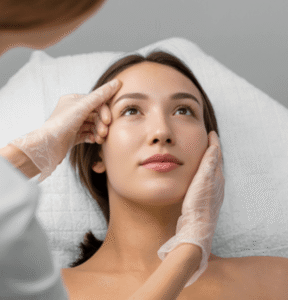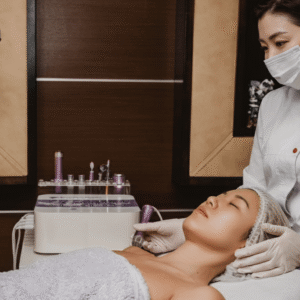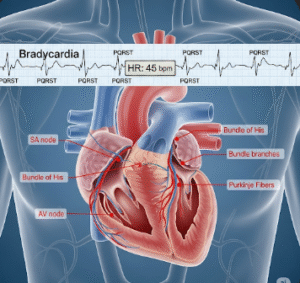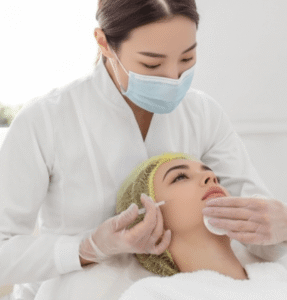Overview
Jaundice is a medical condition characterized by yellowing of the skin, eyes, and mucous membranes, caused by the accumulation of bilirubin in the blood. While it is commonly associated with newborns, jaundice in adults can indicate serious underlying liver, gallbladder, or blood disorders.
In Korea, hepatology and gastroenterology clinics provide comprehensive evaluation and treatment for adult jaundice. With advanced diagnostics and targeted therapies, early detection and treatment of the underlying cause can prevent complications, improve liver function, and enhance quality of life.
Key Facts
- ➔ Jaundice occurs due to elevated bilirubin levels in the bloodstream.
- ➔ Common causes in adults include liver disease, bile duct obstruction, hemolytic anemia, and infections such as hepatitis.
- ➔ Symptoms often include yellowing of the skin and eyes, dark urine, and pale stools.
- ➔ Early diagnosis is crucial to prevent liver failure and other systemic complications.
- ➔ Treatment depends on addressing the underlying cause rather than the jaundice itself.
What is Jaundice in Adults?
Jaundice is the yellow discoloration of tissues resulting from excess bilirubin, a byproduct of red blood cell breakdown. Normally, the liver processes bilirubin and excretes it into bile, but any disruption can lead to jaundice.
- ➔ Pre-hepatic jaundice: Caused by increased breakdown of red blood cells (hemolysis), overwhelming the liver’s capacity to process bilirubin.
- ➔ Hepatic jaundice: Resulting from liver dysfunction due to hepatitis, cirrhosis, or toxins, impairing bilirubin metabolism.
- ➔ Post-hepatic (obstructive) jaundice: Caused by blockage in the bile ducts, such as gallstones or tumors, preventing bilirubin excretion.
- ➔ Clinical significance: Adult jaundice is often a warning sign of underlying disease, and should never be ignored.
What Symptoms Are Related To
Jaundice is often accompanied by a variety of symptoms depending on its cause:
- ➔ Yellowing of the skin, sclera (whites of the eyes), and mucous membranes
- ➔ Dark-colored urine and pale stools
- ➔ Itching (pruritus) due to bile salt deposition
- ➔ Fatigue, weakness, or general malaise
- ➔ Abdominal pain, especially in the right upper quadrant
- ➔ Nausea, vomiting, or loss of appetite
- ➔ Fever or chills if associated with infection
Recognizing these related symptoms helps differentiate the type of jaundice and guides further diagnostic testing.
What Causes / Possible Causes
Adult jaundice can be caused by pre-hepatic, hepatic, or post-hepatic factors:
- ➔ Pre-hepatic causes: Hemolytic anemia, sickle cell disease, or transfusion reactions
- ➔ Hepatic causes:
• Viral hepatitis (A, B, C, D, E)
• Alcohol-related liver disease
• Non-alcoholic fatty liver disease (NAFLD)
• Cirrhosis
• Drug-induced liver injury - ➔ Post-hepatic causes:
• Gallstones
• Tumors of the bile duct or pancreas
• Bile duct strictures or inflammation - ➔ Other causes: Genetic disorders affecting bilirubin metabolism, such as Gilbert’s syndrome
Identifying the exact cause is essential for targeted therapy and preventing progression to liver failure or systemic complications.
When Should I See My Doctor
Immediate medical attention is recommended if jaundice is accompanied by:
- ➔ Rapidly worsening yellowing of the skin or eyes
- ➔ Severe abdominal pain, particularly in the right upper quadrant
- ➔ Dark urine or pale stools
- ➔ Fever, chills, or unexplained weight loss
- ➔ Fatigue or confusion
- ➔ History of liver disease, alcohol abuse, or exposure to hepatitis viruses
Prompt evaluation ensures early diagnosis and treatment, reducing the risk of permanent liver damage.
Care and Treatment
Treatment of adult jaundice focuses on addressing the underlying cause rather than the symptom itself:
- ➔ Medical management: Antiviral therapy for hepatitis, corticosteroids for autoimmune hepatitis, or chelation therapy for specific liver disorders
- ➔ Surgical intervention: Removal of bile duct obstructions, gallstones, or tumors if needed
- ➔ Lifestyle modifications: Avoid alcohol, follow a liver-friendly diet, and maintain a healthy weight
- ➔ Supportive care: Hydration, rest, and monitoring liver function tests
- ➔ Medications for symptom relief: Antihistamines or cholestyramine for itching
- ➔ Monitoring: Regular liver function tests, imaging, and specialist follow-ups
Early, targeted treatment significantly improves prognosis and reduces the risk of complications such as liver failure, bleeding, or infection.
Treatment Options in Korea
Korean hepatology and gastroenterology centers provide advanced care for adult jaundice:
- ➔ Comprehensive evaluation: Physical examination, laboratory testing for liver enzymes and bilirubin, and viral serology
- ➔ Imaging studies: Ultrasound, CT, or MRI to identify obstruction, liver lesions, or structural abnormalities
- ➔ Endoscopic procedures: ERCP (endoscopic retrograde cholangiopancreatography) to remove bile duct stones or relieve obstruction
- ➔ Medical therapy: Antivirals, immunosuppressants, or liver-protective medications depending on the underlying cause
- ➔ Surgical interventions: Gallbladder or bile duct surgery for obstruction or tumors
- ➔ Multidisciplinary care: Collaboration among hepatologists, gastroenterologists, surgeons, and dietitians for optimal outcomes
Leading hospitals such as Seoul National University Hospital, Asan Medical Center, and Samsung Medical Center offer state-of-the-art diagnostics and personalized treatment plans for adult jaundice.
In Summary: Jaundice in adults is a clinical sign of potentially serious underlying conditions affecting the liver, bile ducts, or blood. Early recognition, accurate diagnosis, and advanced treatment in Korea can improve liver function, alleviate symptoms, and prevent life-threatening complications.
- ➔ Key Takeaway: Any unexplained yellowing of the skin or eyes should be evaluated promptly by a specialist.
- ➔ Action Point: Consult a hepatologist or gastroenterologist for comprehensive assessment and personalized treatment.


